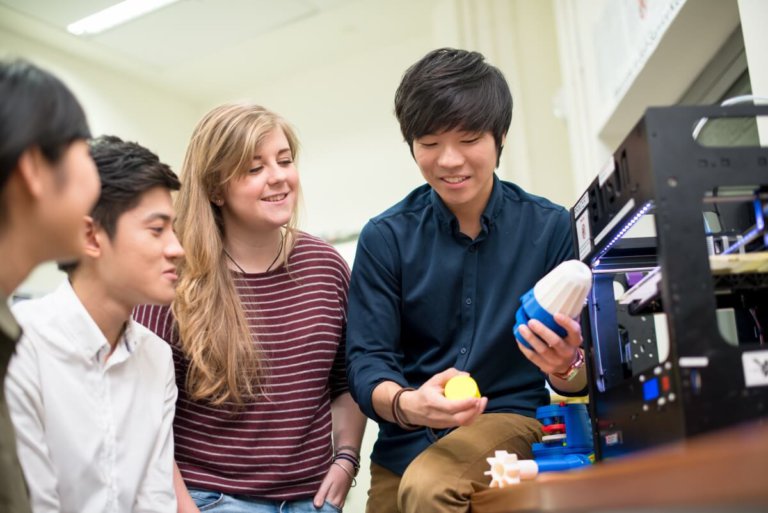
Students pursuing their studies in technology-related fields, such as engineering, computer science, or information systems – have a bright and exciting future ahead.
The growth of new technologies such as robotics, artificial intelligence (AI), machine learning and data science is allowing the tech sector to become even more immersive and innovative.
As technology gradually becomes an integral part of multiple industries – from retail to healthcare, and even food and beverage – more and more technology innovators are needed to come up with solutions to problems that are becoming increasingly complex.
The world is also becoming more interconnected, and in the real working world, people need to collaborate with each other and work in multidisciplinary settings.
That’s why universities today are offering more opportunities for students to develop soft skills such as innovative thinking, collaboration, creativity, flexibility, empathy and adaptability so they can thrive in the future working world.
It’s no longer the case that people should fit into their own neat little boxes. Students in STEM fields are being actively encouraged to learn from humanities and arts subjects where they can learn how to think creatively, improve communication skills, and become well-rounded individuals.

Source: The Hong Kong Polytechnic University
The world is no longer relying heavily on the West, as global connectivity and emerging economies in the East are making countries in Asia become forces to be reckoned with.
In these rapidly growing economies, job markets are flourishing and technology innovators are needed to meet the demands of both burgeoning start-ups and established corporations.
These are four universities in Asia that are leading the way in developing STEM students into technology innovators who are also employable graduates who can thrive now and long into the future.
SINGAPORE UNIVERSITY OF TECHNOLOGY AND DESIGN (SUTD)
Established in collaboration with Massachusetts Institute of Technology (MIT), SUTD is one of the first universities globally to incorporate the art and science of design and technology into a multi-disciplinary curriculum.
SUTD topped the list of emerging engineering schools in the world and also ranked as the fifth most influential scientific research institution in telecommunications. Through its transformative curriculum and unique active-learning pedagogy, the university is reinventing engineering and architecture education to nurture technically-grounded leaders and innovators who are capable of addressing global challenges in this digital age.
Students will be able to choose their specialisation in one of the four multi-disciplinary pillar programmes: Architecture and Sustainable Design, Engineering Product Development, Engineering Systems and Design, and Information Systems Technology and Design, after completing a common curriculum in the first year, which helps them build a strong foundation in Science and Mathematics, Humanities, Arts and Social Sciences (HASS) and design.
All students also study HASS subjects so they can learn how to think critically and self-reflect, becoming holistic leaders with a conscious awareness of the social implications and impact of technology and design innovation.
No classes are carried out on Wednesday and Friday afternoons so students can use this time to pursue personal interests and empower their passions to create a better world beyond the classrooms.
Thanks to close industry links through mandatory internships, capstone projects and more, over 90 percent of graduates are employed within six months of graduating and receive high starting salaries, while others have started companies or are pursuing graduate studies.
FACULTY OF COMPUTER SCIENCE AND INFORMATION TECHNOLOGY, UNIVERSITI PUTRA MALAYSIA (UPM)
Located in Malaysia, another developing nation with a growing economy, UPM’s Faculty of Computer Science and Information Technology consists of four departments: the Department of Computer Science; the Department of Multimedia; the Department of Software Engineering and Information Systems; and the Department of Communication Technology and Network.
 The Faculty aims to develop graduates and leaders who have academic knowledge in their specialisations of technology, but can also think critically and communicate effectively so they can become innovative leaders.
The Faculty aims to develop graduates and leaders who have academic knowledge in their specialisations of technology, but can also think critically and communicate effectively so they can become innovative leaders.
Students in the respective departments take mandatory courses such as Public Oration and Basic Entrepreneurship, giving them plenty of opportunity to build their soft skills.
They can also choose specialized, industry-relevant electives so they can select classes that are in line with their professional goals.
For example, students in the Department of Computer Science can opt to take Data Mining, Cryptography, or Robotic System Development courses, among others.
Similarly, those in the Department of Multimedia can enrich their academic experience by undertaking electives such as Virtual Reality, Mobile Application, or Computer Games Development in addition to their core subjects.
As a research-intensive university, students and faculty are also involved in research activities in exciting areas of technology such as Applied Informatics, Information Security, Digital Information Computation and Retrieval, and Intelligent Computing.
COLLEGE OF ENGINEERING, SEOUL NATIONAL UNIVERSITY
At Seoul National University (SNU) in South Korea, the aim is to develop leaders in the global industry and society.
 Graduates have gone on to become CEOs of multinational corporations, entrepreneurs and world-class engineers, involved in different levels of society to become the driving force behind national development.
Graduates have gone on to become CEOs of multinational corporations, entrepreneurs and world-class engineers, involved in different levels of society to become the driving force behind national development.
The SNU College of Engineering is made up of a world-class faculty with professors from all around the world who are passionate about education and research.
The College of Engineering provides an enriched curriculum structure which lays the foundation for future technology innovators and leaders.
Undergraduate programmes in the College include Architecture and Architectural Engineering, Chemical and Biological Engineering, Civil and Environmental Engineering, Energy Resources Engineering, and Electrical and Computer Engineering.
The curriculum is also tailored to certain subjects so students are well-equipped to meet the future demands of society. For example, the curriculum in the Energy Resources Engineering programme focuses on topics such as fossil fuels, renewable energy, exploration and development of mineral resources, as well as other areas of environmental change.
In every programme, students simultaneously build academic knowledge in their field while learning skills like problem-solving, communication, innovative thinking and collaboration.
DEPARTMENT OF COMPUTING, THE HONG KONG POLYTECHNIC UNIVERSITY
The Department of Computing (COMP) at The Hong Kong Polytechnic was the first department to offer computing education in the territory back in 1974.

Source: The Hong Kong Polytechnic University
It has since gained international recognition for world-class research and high-quality education, ranking 51-100 in the QS World University Rankings 2018 by Subject – Computer Science & Information Systems, and 34th in Computer Science in the “Best Global Universities Rankings” by US News and World Report 2019.
The Department is dedicated to nurturing students into future innovators and leaders, delivering high-quality undergraduate, graduate and postgraduate programmes in computer science and multidisciplinary areas of IT and enterprise computing.
The university is also committed to social responsibility and developing students who can tackle societal challenges and contribute meaningfully to society and beyond.
In addition to learning in-depth knowledge about computing, students take courses that supplement their Hong Kong learning experience.
This includes innovative classes such as Social and Collaborative Computing, IT Computing, Socially Responsible Global Leadership in a Digital World, and Friends, Followers and Circles Connections in a Socially-Computed World.
Studying in a bustling and thriving city such as Hong Kong, with its strategic location in Asia, allows students to forge industry connections and apply for internships in booming companies.
*Some of the institutions featured in this article are commercial partners of Study International
Liked this? Then you’ll love these…
Prepare to enter Industry 4.0 at Hong Kong Polytechnic University
Why Asia is the top choice for your postgraduate engineering study







